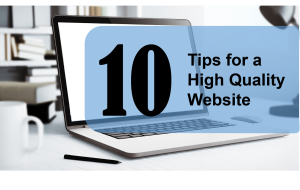 Website creation. If you haven’t already made a website, there are a few possibilities to consider. If you don’t know any professional web designers, your options are to hire someone (or a company) or use a do-it-yourself website building platform like Wix or Squarespace. Usually those platforms are a more cost-effective way to build a website, but that also means it will be less customized.
Website creation. If you haven’t already made a website, there are a few possibilities to consider. If you don’t know any professional web designers, your options are to hire someone (or a company) or use a do-it-yourself website building platform like Wix or Squarespace. Usually those platforms are a more cost-effective way to build a website, but that also means it will be less customized.
Textual content. Once you know your approach for website creation, you need to decide what you want to say. People love to read and are always looking for information, so the text on your site is very important. It has to be quality writing relevant to your industry. Specific industry jargon should be used when appropriate, but a defining how that term is used within your company should be considered alongside the term if it’s more abstract.
A clear message and about page. There must be a sentence or two somewhere on your website that describes what you offer or who you help. If you are leaving your website viewer still questioning who you are and what you do, then your website essentially serves no purpose.
Call to action. Another essential piece of text on your website is a call to action. Include text somewhere on your main page like “Contact us!” or “View our blog!” to get business started. Of course you can get more creative with this, but it is an easy and effective tool to add to your website that will boost lead generation.
Visual content. You also want to include content that is eye-catching. In addition to text, visuals are also a key component to a well-rounded website design. Whether it is pictures, videos, infographics, or other interactive media, your website should include content that is visually and psychologically engaging that will attract people to your company.
Contact information. Make it easy for people to contact you. This is an absolute must! Include a phone number, address, contact email, and links to social media sites. Another consideration is a contact form for people to leave their name, contact information and a brief message.
Creative and up-to-date design. There are so many template designs out there to get you started with an attractive and stylish website, so there should be no excuses here. The design should be a reflection of your company, yet still be modern and pleasing.
Mobile friendly. Nobody likes a website that can’t be read on a smartphone. With rapidly increasing mobile usage rates, it is almost essential to have a mobile friendly website. You may also want to consider adaptive design, so that your website is viewable on all devices, including computers, mobile phones, and tablets. A website built with adaptive design recognizes the device it’s being viewed on and changes the interface accordingly to fit the screen. This is also becoming a big component of website ranking algorithms and can help your SEO.
Easy to navigate. Some websites are confusing and hard to find your way around. Make sure the menu is simple and organized with easy user interface tools. Group your information into categories that make sense for all users. Not everyone searches the same way, so a listing of products by technology as well as market served can be key to engaging multiple types of users.
Content marketing tools. Pages like a blog or news page help drive website views. Here, up to date info and consistent posts are essential. Not only does this help with keyword search, but readers can also get a feel for the company and how you operate. Once again, people love to read and want to see information, so a blog or even social media posts can help boost your credibility when you supply helpful and educational information.
BONUS: SEO tools. A website can only be impactful if it’s seen. Ensure your website is taking advantage of all the latest SEO best practices, such as hyperlinks, meta tags, mentions and more to rank as high as possible. Search is a large component of web traffic, so don’t forget to update your SEO pack often to incorporate the latest offerings from your company. Keywords and context are important for ranking and quality score.
Remember, a website is an extension of its company and is essential for business branding. Poor web design can give the impression of ineffective products or service. Alternatively, a strong, well-designed website can build a sense of legitimacy and trust. It can be the difference between gaining a customer and losing them to your competitors, so putting in the effort to create a quality business website is essential.
